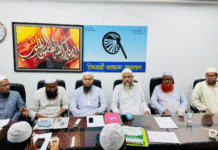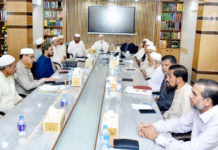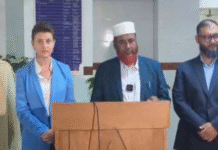
BNP Standing Committee member Salahuddin Ahmed today (10 August) said that reforming the state structure will be pointless unless rulers, politicians and citizens change their mindset and attitude.
“Let us adopt a mindset where we go through reform every day — a reform aimed at public welfare, so we can work towards building a welfare-oriented state and society,” he said while addressing an event organised by “Amra BNP Poribar” at the BNP Chairperson’s office in Gulshan, Dhaka.
The event was held to provide medical assistance to those injured in the July Uprising.
The senior BNP leader said everyone is now talking about reform at the state level, but reforming just the system alone is not enough.
“If we truly want a welfare-oriented and humane state, we must also reform our way of thinking. Those who will run the state must go through a reform of its mindset, the people must also go through mental reform, and our mindset as a whole must change,” he opined.
Salahuddin said only a collective transformation of the people, the society and the political leadership could help implement true structural reform.
He believes that if that happens, it would lead to the creation of a humane and welfare-oriented state.
“We have to see reform as a continuous process. Only then can we build a state structure that serves the people, where both the leaders and the citizens share responsibility,” the BNP leader said.
Salahuddin said this is the change of mindset the nation now needs, and only then would it be possible to have a dynamic government, state and society that reflect the dreams of the martyrs and freedom fighters.
The BNP leader said the country will now have a democratic constitution through reforms.
He, however, questioned how a humane state can exist if neither the rulers nor the people change their mindset. Salahuddin said that if people think all responsibility lies with the government, it is a wrong idea.
‘National heroes’
Meanwhile, referring to the sacrifices made during the July Uprising and the 1971 Liberation War, he said, “Those who sacrificed lives for democracy are national heroes.”
Salahuddin commented that all individuals who sacrificed their lives for democracy over the past 16 years should be regarded as “national heroes.”
The senior BNP leader stated that this group of “national heroes” includes those who died in the July Uprising, as well as those who were victims of extrajudicial killings, enforced disappearances, or suffered permanent disabilities during the 16-year anti-autocracy movement.
He added that the fall of the Awami League government was not solely the result of the 36-day student-people uprising but was built upon the foundation of a protracted struggle spanning 16 years.
He also claimed that over 7,000 people were victims of various forms of repression, including enforced disappearances and extrajudicial killings, between 2008 and 2023, citing data from human rights organisations.
Detailing the figures, Salahuddin Ahmed stated that a total of 7,188 people were victims of “retaliatory attacks.” He specified that this number includes 709 victims of enforced disappearances, many of whom are still missing, and 2,693 victims of extrajudicial killings.
Referring to the July Uprising, he claimed that more than 1,400 people were killed, over 20,000 were seriously injured, and approximately 500 people lost their eyesight.
The BNP leader expressed regret that authorities have yet to compile an accurate list of victims, noting that hospital registers have disappeared and the locations of “mass graves” are unknown.
He asserted that the state, society, and political parties have a responsibility to the martyrs and the injured, a duty that he said the BNP is committed to fulfilling.









